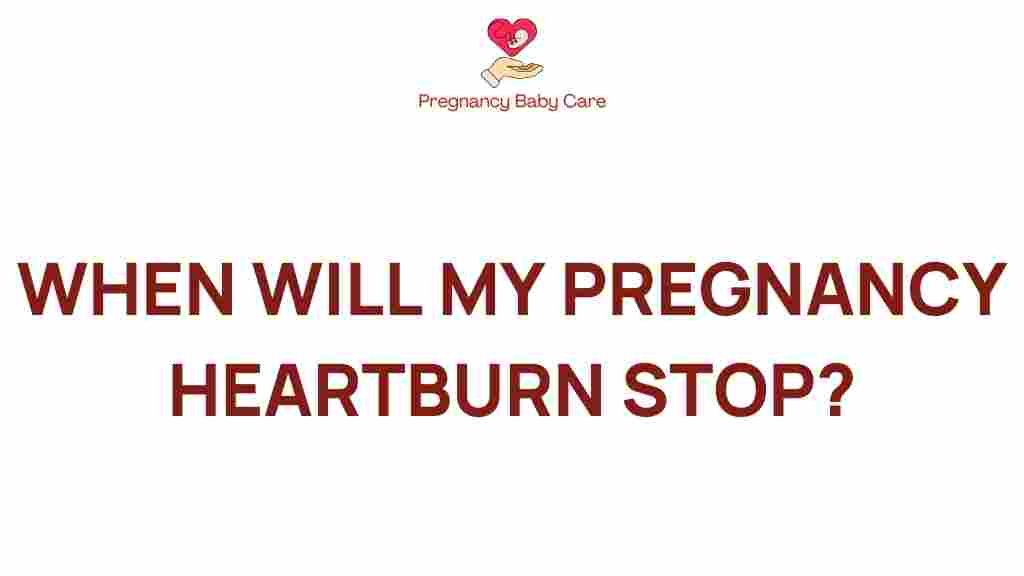The Burning Question: When Will My Pregnancy Heartburn End?
Pregnancy is a beautiful journey filled with excitement and anticipation, but it also comes with its fair share of discomforts. One of the most common complaints among expecting mothers is pregnancy heartburn. This uncomfortable sensation can leave many wondering, “When will my pregnancy heartburn end?” In this article, we will explore the causes of pregnancy heartburn, relief tips, and lifestyle changes that can help alleviate this discomfort. We’ll also discuss the common symptoms of heartburn during pregnancy and share some natural remedies to support digestive health.
Understanding Pregnancy Heartburn
Pregnancy heartburn, also known as acid reflux, is a frequent issue that arises during pregnancy. It occurs when stomach acid flows back into the esophagus, causing a burning sensation in the chest and throat. This condition is especially prevalent during the second and third trimesters due to hormonal changes and the growing uterus pressing against the stomach.
Common Symptoms of Pregnancy Heartburn
Expecting mothers may experience a variety of symptoms related to pregnancy heartburn, including:
- Burning sensation in the chest (heartburn)
- Regurgitation of food or sour liquid
- Difficulty swallowing
- Sore throat or hoarseness
- Chronic cough or wheezing
If you are experiencing these symptoms, you are not alone. Many women report heartburn at some point during their pregnancy, with varying degrees of severity.
Why Does Heartburn Occur During Pregnancy?
Understanding the causes of pregnancy heartburn is crucial for managing the discomfort. There are several factors at play:
- Hormonal Changes: Increased levels of progesterone relax the muscles in the digestive tract, which can lead to slower digestion and the potential for acid reflux.
- Growing Uterus: As the baby grows, the uterus expands and can put pressure on the stomach, pushing acid back into the esophagus.
- Dietary Changes: Many expecting mothers experience cravings and aversions that can lead to the consumption of heartburn-triggering foods.
When Does Pregnancy Heartburn Usually Start and End?
Pregnancy heartburn typically begins in the second trimester and can continue into the third trimester. For some women, heartburn may persist even after delivery, especially if they are breastfeeding. The good news is that for many women, pregnancy heartburn often subsides within a few weeks after giving birth.
Relief Tips for Pregnancy Heartburn
While it can be challenging to cope with pregnancy heartburn, there are several effective relief tips that expecting mothers can try:
- Eat Smaller Meals: Instead of three large meals, opt for five to six smaller meals throughout the day to minimize pressure on your stomach.
- Avoid Trigger Foods: Common triggers include spicy foods, fatty foods, chocolate, caffeine, and citrus. Keeping a food diary can help identify your personal triggers.
- Stay Upright After Eating: Remain sitting or standing for at least an hour after meals to prevent acid from flowing back into the esophagus.
- Wear Loose Clothing: Tight clothing can increase abdominal pressure and exacerbate heartburn. Choose comfortable, loose-fitting attire.
- Elevate Your Head While Sleeping: Use extra pillows to prop up your head and shoulders, reducing nighttime heartburn.
Lifestyle Changes to Improve Digestive Health
Making some lifestyle changes can significantly improve digestive health and reduce the severity of pregnancy heartburn:
- Stay Hydrated: Drink plenty of water throughout the day, but avoid large quantities during meals to prevent a full stomach.
- Practice Relaxation Techniques: Stress can worsen heartburn, so consider practicing yoga, meditation, or deep-breathing exercises.
- Exercise Regularly: Gentle exercise can aid digestion. Walking is a great option for expecting mothers.
Natural Remedies for Pregnancy Heartburn
In addition to lifestyle changes, several natural remedies may provide relief from pregnancy heartburn:
- Ginger Tea: Ginger is known for its anti-nausea properties and may also help with heartburn. Consider sipping ginger tea to soothe your stomach.
- Aloe Vera Juice: Drinking a small amount of aloe vera juice may help reduce inflammation in the esophagus.
- Apple Cider Vinegar: Some women find relief by mixing a teaspoon of apple cider vinegar with water and drinking it before meals.
Always consult with your healthcare provider before trying any new remedies, especially during pregnancy.
Troubleshooting Tips for Persistent Heartburn
If your pregnancy heartburn persists despite trying various relief tips and lifestyle changes, consider the following troubleshooting strategies:
- Keep a Heartburn Journal: Document your meals, symptoms, and activities to identify patterns and potential triggers.
- Consult Your Doctor: If heartburn becomes severe or unmanageable, speak with your healthcare provider for further evaluation and possible treatment options.
- Consider Antacids: Over-the-counter antacids may provide temporary relief, but check with your doctor before use to ensure they are safe for you.
Conclusion
Pregnancy heartburn can be an uncomfortable reality for many expecting mothers, but understanding its causes and implementing effective relief tips can make a significant difference. By making lifestyle changes, avoiding trigger foods, and considering natural remedies, you can manage this common symptom more effectively. Remember, it’s essential to consult with your healthcare provider for personalized advice and treatment options. With the right strategies in place, you can focus on enjoying your pregnancy journey rather than being hindered by heartburn.
For further information on digestive health during pregnancy, check out this helpful guide.
For more tips and advice on managing pregnancy symptoms, visit this resource.
This article is in the category Pregnancy and created by PregnancyBabyCare Team
